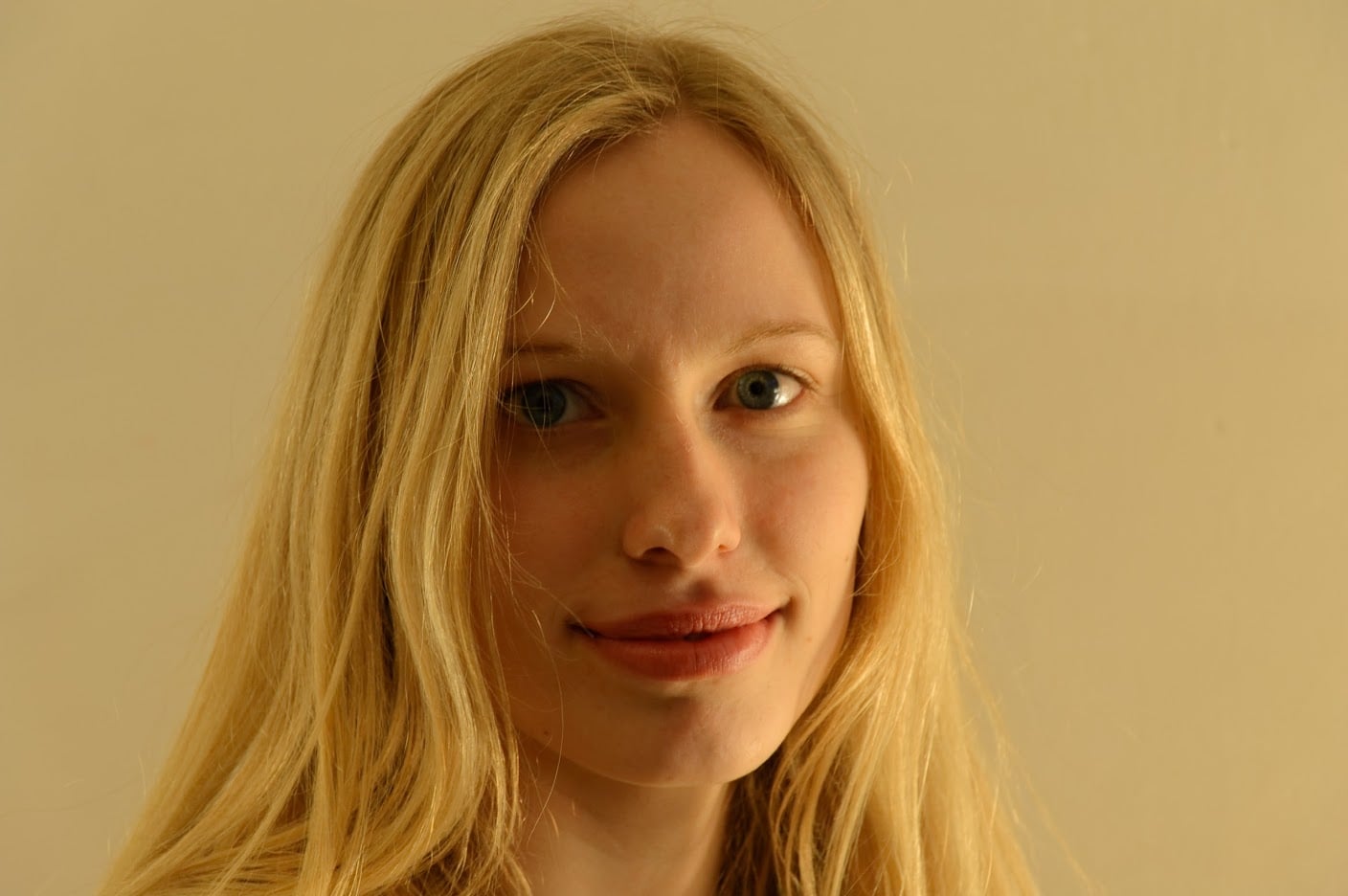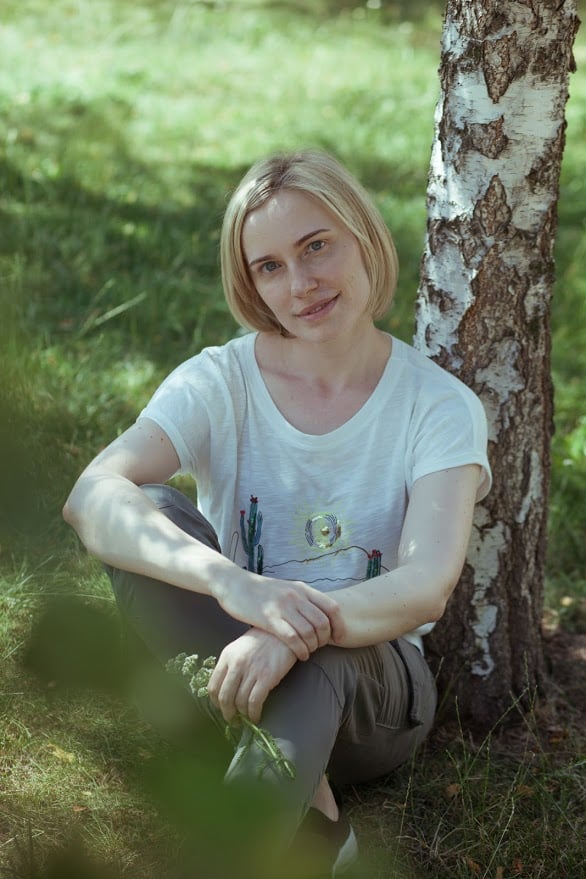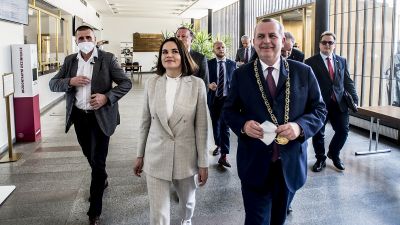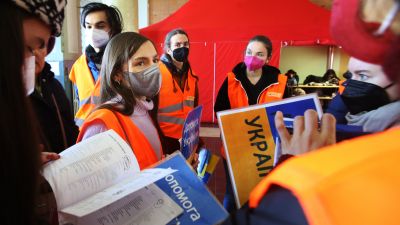“I don't know a single Belarusian who supports the war in Ukraine. After all, Lukashenko won no more than 30 percent of the vote in the presidential election,” says Larysa Aharkava, a Charles University graduate. She came to the Czech Republic from Belarus at the age of 18 and has been working for Google for the last 12 years.
How have you been affected by current events in Ukraine, Belarus and Russia?
The first week of the war was one of the worst in my life. I have a lot of friends from Ukraine and they started their morning by calling their loved ones to see if they are still alive. My personal situation is not too bad, but I don't know when I will see my parents again or if I will ever see my grandfather, who is eighty-six years old.
A lot of friends I have from Russia are also good people. They never voted for Putin, they don't support what he is doing and they feel enormous guilt for what is happening. I don't know any Russian speaker who hasn't been personally affected by this situation - but of course the most affected are the Ukrainians themselves. What is happening in Ukraine is completely incomprehensible and should never have happened.
How do you feel about Belarus being viewed as an accomplice of Putin?
Since 2020, Belarus has been hostage to an illegitimate government that holds on to power by force. In the presidential elections, Alexander Lukashenko won no more than 30 percent of the vote, according to independent polls. Belarusians tried to prevent his rule, but the protest was suppressed, and quite brutally. I do not know anyone, and I know hundreds of Belarusians, who would support a war with Ukraine. That is why I think that Lukashenko, not Belarus, is an accomplice of Putin.
You left the country 20 years ago. Even then, Lukashenko was in power and was strengthening his presidential powers at the expense of democracy. Did you leave for political reasons?
To tell you the truth, I didn't even think about it in those terms. I was living a nice easy life as a young person, a student. But I'm a very curious person. The main reason I left was to experience something new. In Belarus around 2000 it was still good, quite a lot of freedom, the economy was growing, people were optimistic.
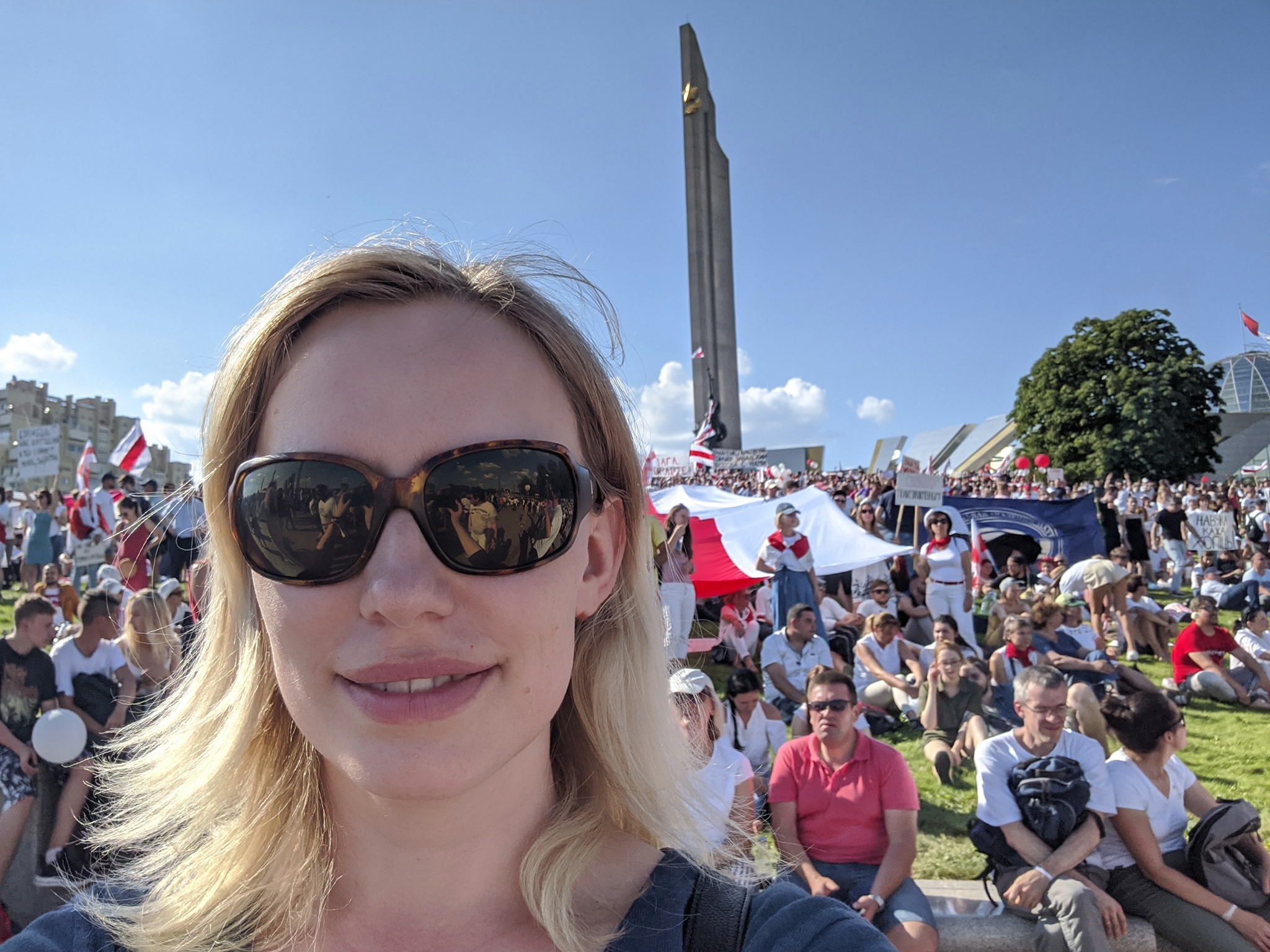
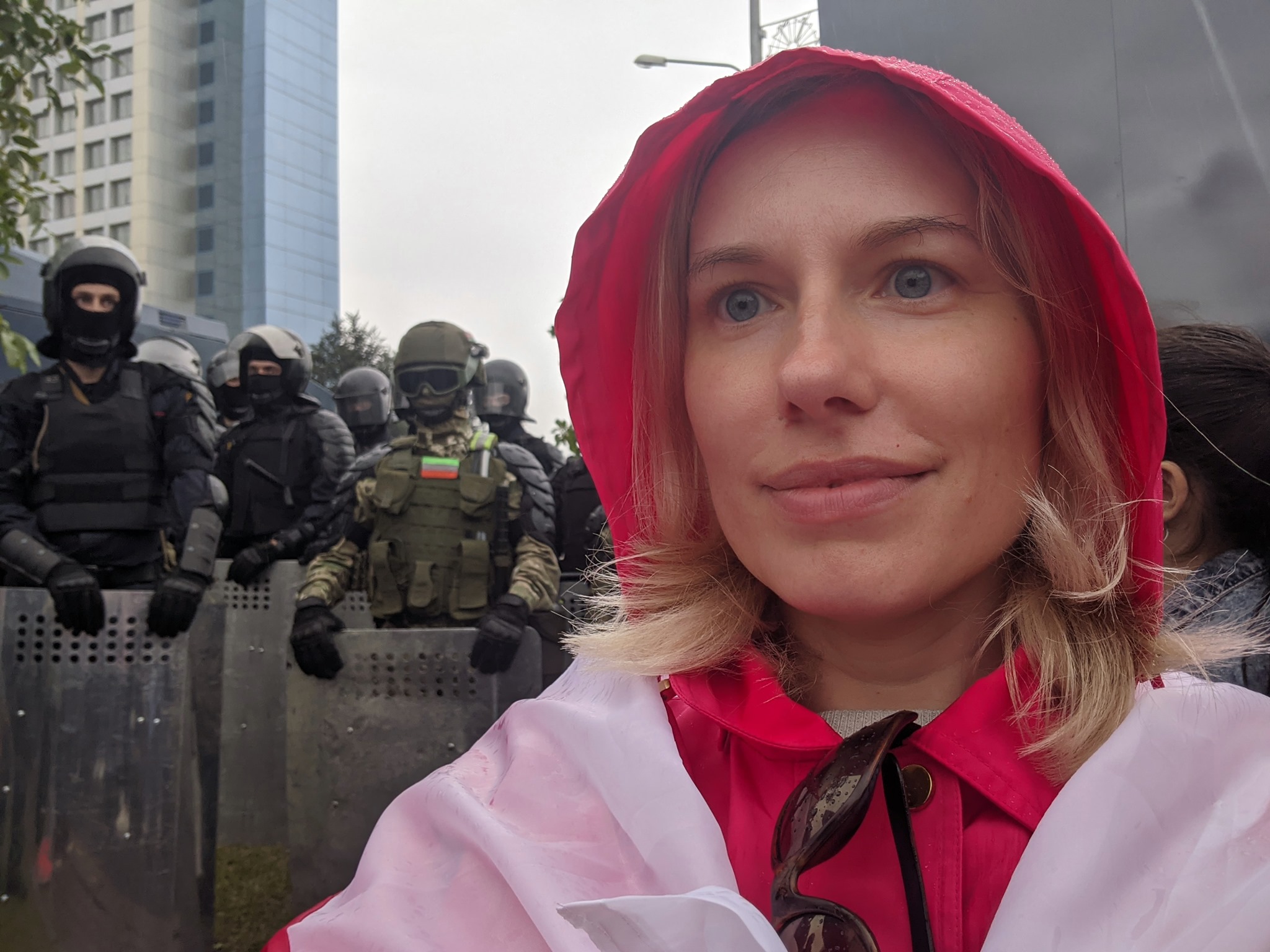
August/September 2020: Taking part in protests in Minsk against A. Lukashenko, who claimed he won the presidential election.
How did you hear about the opportunity to study in Czechia?
I was in my first year at the Belarusian State University and I learned from a relative who was in the opposition party against Lukashenko that the Czech Republic was offering scholarships for Belarusians - people in the opposition and for their children and relatives. Each opposition party has been given several such places. I had several interviews at the Czech embassy, and finally they let me know that I had been selected.
How old were you then?
Eighteen years old. It was kind of scary for me to leave like that. My family and friends, my whole life was in Minsk. But I took it as a once-in-a-lifetime opportunity. I told myself that if I didn't go, I might regret it later, and if I didn't like it here, I could always come back (laughs).
You ended up staying in the Czech Republic for eight years. You've been living in California since 2010. How is it that you still have such great Czech?
My husband is Czech. We don't have any long philosophical debates at home, so I'm not getting any better, but it's enough to maintain my current vocabulary (laughs).
Before studying at the Faculty of Mathematics and Physics, you learned Czech at the Institute of Language and Vocational Training at the Charles University in Poděbrady. How did you get on?
Compared to many of my classmates, I had the advantage of already speaking two Slavic languages, Russian and Belarusian. This made it quite easy for me to learn additional ones. Moreover, Belarusian is similar to Polish. Before coming to the Czech Republic I was visiting Poland and after two days I started to understand Polish without knowing the language. In the same way, I understand Ukrainian passively. There were a few Slovaks living with me in the dormitory, and I understood them perfectly well.
Did you study only Czech, or did you study for the math entrance exam?
I was very confident that I knew mathematics, because I had done one year at university in Belarus. I mainly wanted to study computer science. I sent out applications to several colleges in the Czech Republic and got in everywhere. I chose Charles University because it has one of the strongest programs in terms of computer science, but mainly I wanted to study at the oldest and most famous university in the Czech Republic.
You didn't have any problems with Czechs?
Everyone was nice and kind to me. I got married at the end of my studies, so I got permanent residence here, but until then I had to renew my student visa every year, and that was definitely not pleasant. There were times when I had to arrive at the office at night, in the winter, and queue up to get through the procedure. I did not even have pleasant experiences with officials who asked me point-blank if I was going to do prostitution. Sure, I'm a younger girl from the East and maybe they have certain stereotypes about us here, but it was very rude to ask such things. Did they expect me to say yes? That kind of behaviour made no sense at all.
Can you compare studying at Charles University with your university in Minsk?
In Belarus, we solved most of the mathematical problems only at the theoretical level, even things that are closely related to practice, like information security. But then you come to the computer and you don't know how to apply the theoretical knowledge. That's what I liked about your university, that right from freshman year we learned a lot of practical things. Of course, there were also theoretical examples, theorems, integrals, but in Belarus that was 90 per cent of the learning, whereas at CU it was about 50 per cent. Also, the teachers at Matfyz [the nickname for the Faculty of Mathematics and Physics) were much more flexible – ed. note]. For example, I knew a lot of things from before, but I used a different approach than what was taught here. The teachers tried to understand me and they acknowledged the result if it was correct. That didn't exist in Belarus. Such an approach to students, not only from abroad, is excellent because it offers a much wider range of perspectives on how to understand things, how to learn.
Two years after graduating from Matfyz, you joined Google, where you still work today. How did you manage that?
A classmate of mine from Belarus worked at Google and found out that the company pays a reward to its employees for recommending someone to them, and an even bigger amount if they then hire that person. So my friend started recommending to them all kinds of people he knew with at least some qualifications to work at Google, including me. Then, when I got the offer after going through all the possible interviews, I didn't hesitate at all. I considered it a once-in-a-lifetime opportunity.
What position did you start in at Google?
First, I did a three-month internship in Zurich and then I was offered a full-time position in California. The positions are numbered from three - that's where I started as someone who had either just finished college or had minimal experience in the industry. Now, 12 years later, I'm at level six. That's more of a management position; I have my own team.
What specifically are you involved in?
I work in infrastructure, the product we develop is part of Google Search. One of Google's key activities is gathering information from lots of websites. This is then further processed at various levels, and one of those is done by our team. We find keywords, we build content indexes (what that particular page is about). We have a huge amount of data and we process a really huge amount of information from it - that's our specialty. Very surprising at Google, that (laughs).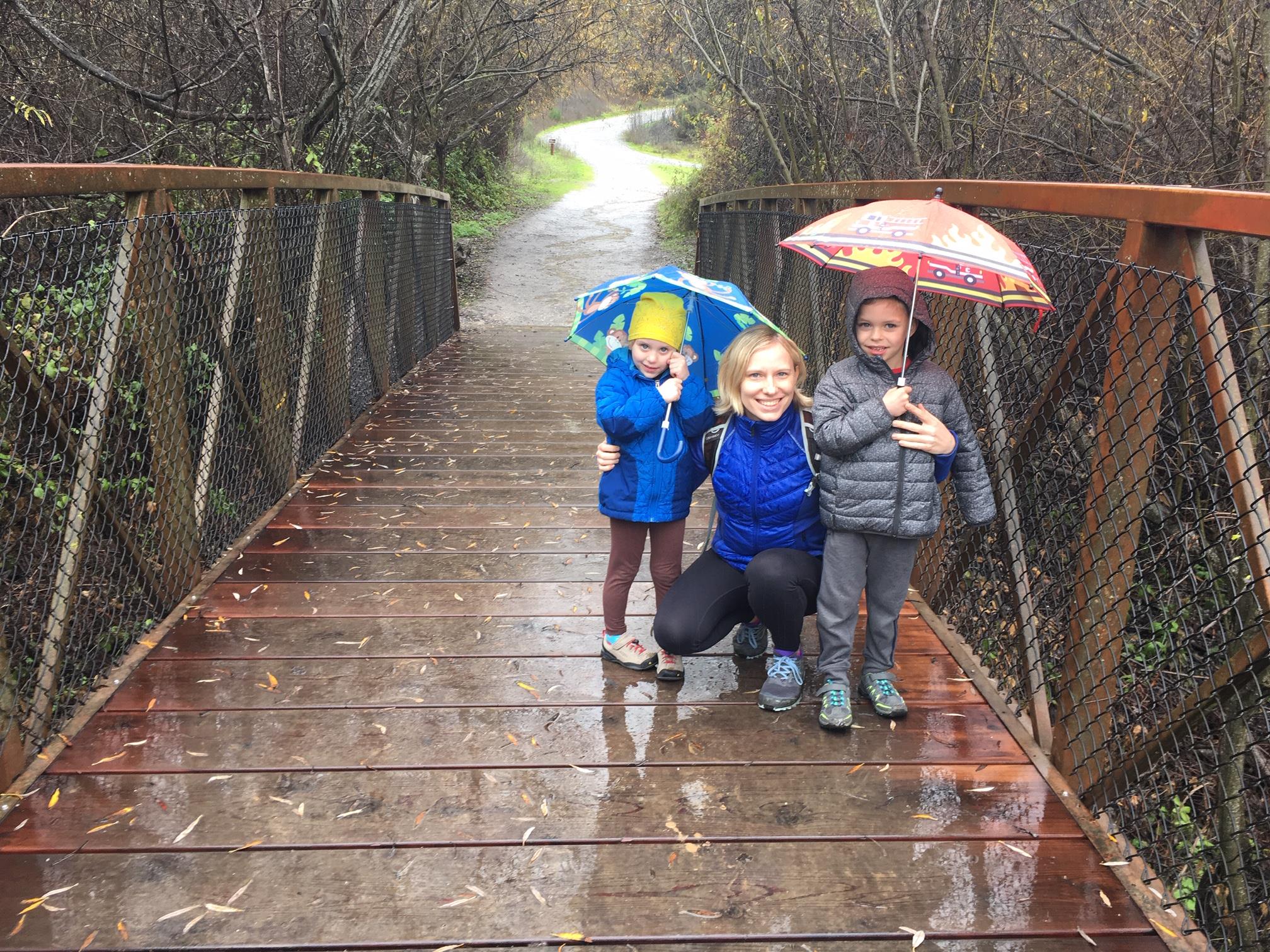
How do you feel about the immense power of Google that you're a part of? You create something and almost instantly it affects virtually all people around the world?
It's fascinating to me. I'm not saying I would do everything the same way if I were running Google, but for the most part I think it's a good company and it's good for the world. It's pushing technology forward and I feel really proud to work for it. Recently, my family and I were on a trip and I needed to make a restaurant reservation during the trip. In the US, Google already offers an app that allows a robot to call the restaurant instead of a human. The technology is still in its infancy, but I'm really looking forward to having robots handling routine phone calls and orders for me within five years.
Can you imagine working here until you retire?
Why not? Because it's such a huge company, you have the opportunity to move around a lot of different areas and departments. A lot of times, you can move within the company and do something completely new. You can find everything within IT at Google. But still, until a few weeks ago, I could imagine living in Belarus. Thanks to Covid, I've already had the opportunity to try it out.
Have you worked for Google remotely?
Yes. When schools closed in California and my and my husband's office closed, we moved to Minsk to visit family. I was actually there as a tourist. She continued to work for Google, earning an American salary, which can afford you practically everything in Belarus. It's a nice country, and if I was able to make normal money there, I would live there. Of course, in a normal situation - certainly not in the current situation.
As a mother of two, I'm sure you're glad for the flexible working arrangements.
We all work from home for now. In the future, the plan is to home office on Mondays and Fridays, with the understanding that if one lives far away or doesn't like that arrangement, one can apply for permanent telecommuting, which quite a few people in my area have done. Of course, as a manager, it is easier for me to manage a team that is onsite. However, I understand that finding a good programmer is not easy, and it's better to have a good remote programmer than not having one at all.
| Larysa Aharkava |
| Larysa Aharkava comes from Minsk, Belarus. At the age of 18 she moved to the Czech Republic, where she studied at the Faculty of Mathematics and Physics, and lived until 2010. Two years after graduating from Charles University, she started working for Google. Since then, she has lived in Mountain View, California with her husband and two children. |


